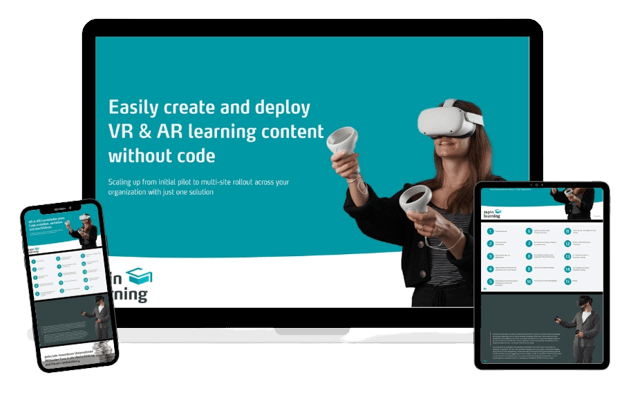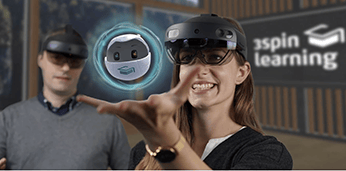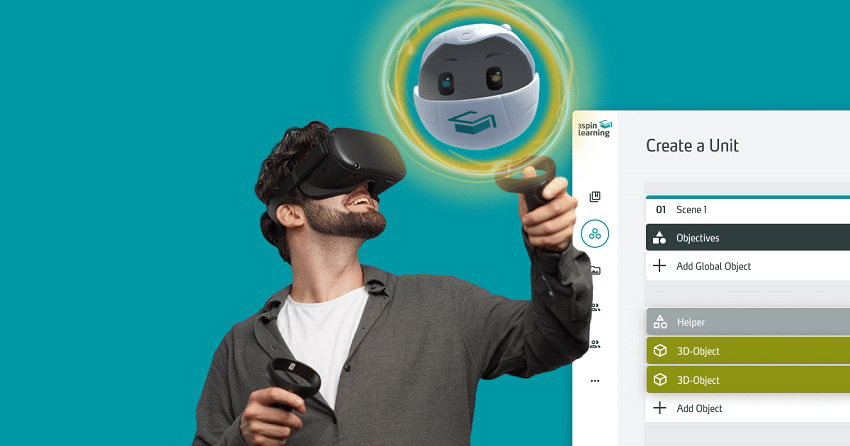Virtual Reality Immersion: Why Hands-On Experience is More Effective than “Knowledge”
How immersion in virtual reality makes learning more sustainable than pure knowledge. Psychological effects, VR learning, and personality development...
Success guaranteed with VR learning: learn the secrets of master speakers in VR thanks to ground-breaking VR & AI technology.
In the age of digital transformation and constant progress, the formation and further development of skills is a decisive factor for individual and professional success. Combining innovative technologies such as Virtual Reality and Artificial Intelligence with methodological and didactic expertise plays an important role here.
One organization that skilfully combines these elements is the publisher Verlag Dashöfer with VR EasySpeech Dashöfer with VR EasySpeech. In their unique VR training courses, learners can learn to hold conversations and give presentations in VR. In an exclusive interview with Fabian Friedrichs, Managing Director of the publishing house, we find out more about their pioneering EasySpeech software:
FF: EasySpeech is a software for training speeches and presentations. EasySpeech's great strength is the ability to experience stage fright and stress. Users can immerse themselves in the immersion effect faster than before. With the software, we can empathise with situations on the presentation stage in front of observers, during presentations and lectures - and in many different languages. After completing a presentation or exercise, each user receives an objective evaluation using artificial intelligence. Among other things, eye contact, speed, pauses and filler words such as "erm" are analysed.
We focus primarily on HR and sales departments in larger companies - from SMEs to large corporations. Of course, some private individuals, trainers and coaches also learn with us, incorporating their speaking and presentation skills into the training sessions.
FF: It depends on the target group and the respective use case: For example, lawyers and managers need different solutions than trainees or sales employees in onboarding. Ultimately, our tool is mainly used for self-study training.
Users can complete a full public speaking presentation training course with us using VR glasses. In combination with our Learning Portal, they go through various modules step by step. This allows them to develop their public speaking skills regardless of their location. Companies can train their employees with us in face-to-face or online seminars and then put them into practice using the VR glasses.

FF:Yes, because we are not just VR software, but have also integrated Artificial Intelligence, we can track many KPIs wonderfully. Disruptive factors within online lectures, presentations or other rhetorical modules can be easily analysed - on a rhetorical basis using transcription.
This means being able to convert the audio into text. Pauses, speed and points of contact can be analysed and clustered into various criteria from 1 to 10. The higher the score, the better the performance. This tracking option is ideal for recognising challenges and areas for improvement at a glance and allows learners to be assessed objectively.
For example, we analyzed the entire year 2022 with our customer Fressnapf and found that the average score had improved by 90%. Thanks to AI, we were able to prove that learners were able to improve their speaking speed, number of filler words and the like over the entire period and across all participants. Scores like this bring a certain objectivity to the training courses and show the success of the training methods in black and white.
After all, we know that HR managers and executives need clearly measurable key figures to visualise the actual success of training courses and the skills development of employees. VR and AI help significantly here.
FF: We adopted a digital strategy early on and are now a digital specialist publisher. This applies to all our products and our 300 employees at all seven locations. On the other hand, we are still a family-run publishing house with a focus on innovation. That's why we are always on the lookout for the latest technology for our business model and our training programs.
With our focus on training, seminars and conferences in the areas of law, tax, accounting, management and soft skills, incorporating Virtual Reality was an obvious choice. After all, VR enables skills-orientated learning that is independent of time and place.
That is why we are focussing on our EasySpeech startup alongside our core business. Both divisions are mutually beneficial, although the sales channels and target groups are currently still quite different. In publishing, we work with small to medium-sized companies, whereas in VR training we have to think bigger. That's why both divisions work with each other and not against each other; they are much more co-operation than competition.
FF: In the beginning, when we started EasySpeech five years ago, I visited our customers in person, from large companies to trainers and coaches, bringing VR training with me. Initially, they said that they would never incorporate virtual reality because that would mean that they would do away with themselves.But the opposite is true. Both methods have their raison d'être and I would say that it's the combination of different learning formats that counts.
EasySpeech is extremely strong in practical training. Thanks to the possibility of online learning, training can be completed in a hotel shortly before performances or anywhere else. On the other hand, other topics are better delivered in a face-to-face or other eLearning format.
FF: EasySpeech's strength is its application-orientation. We do not focus on some use cases. Software such as 3spin Learning can be used to beautifully set up an onboarding journey in Virtual Reality or 360-degree videos in combination with a certain degree of interactivity. With EasySpeech, we have deliberately focussed on application-based training and also use an authoring platform to offer our customers additional products.
FF: Yes, we are currently working with one of the largest roofing companies in Germany.The company is training its more than 500 employees in presentation training with EasySpeech because it is growing rapidly throughout Germany. They were looking for a smoothly functioning onboarding process. That's why we systematically set up an onboarding journey for new employees in an initial pilot project using 3spin Learning's software.
Connecting several people is not our core competence, and that's where 3spin Learning comes into play as an authoring tool.

FF: Thanks to the collaboration with 3spin Learning, we work closely with our customers. In the onboarding journey, we know what makes the HR department tick and how the training courses should be structured methodically and didactically.
3spin Learning's authoring tool has the technological capabilities to systematically set up an onboarding process.
Together, we are creating a complete package where customers get a ready-to-use VR headset on which the entire onboarding journey is played out and they don't have to worry about the technical details.
FF: We have been working with an AI connection in speech recognition for more than five years. Over the past year, however, it has become increasingly clear that generative artificial intelligence in particular has become an indispensable tool that can no longer be avoided - both by learning providers and customers.
We are working flat out on how to analyse content even better in the future. So far, we have only done a simple rhetorical evaluation of our training courses, but the upcoming developments for learning management systems with generative AI are very interesting. We are currently considering what else EasySpeech can analyse, such as facial expressions and gestures.
Thank you very much for the interesting conversation, Fabian.

As Managing Director of the Verlag Dashöfer publishing group, Fabian Friedrichs has been in charge of the specialised publisher for accounting, tax and law for twelve years.The family-owned company is represented at seven locations with 300 employees throughout Europe and offers high-quality, application-oriented training courses that provide real added value for the target group.

How immersion in virtual reality makes learning more sustainable than pure knowledge. Psychological effects, VR learning, and personality development...
Looking to maximize your training potential? Discover how VR training provides a safe, engaging, and effective learning experience
Learn how Virtual Reality takes leadership training to a new level and strengthens soft skills in an interview with digital learning agency vr-train.
Stay up to date on new insights in VR / AR learning with AI and build or improve your knowledge within the technology.